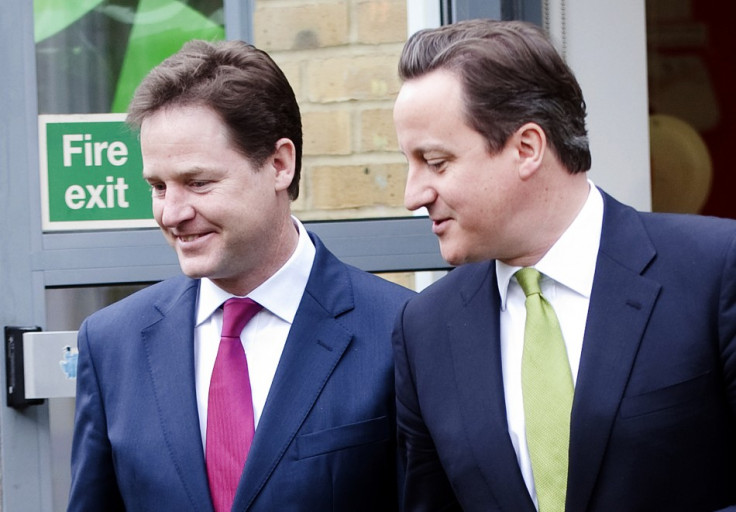Clegg Hints at Favouring Another Coalition with Tories in New Hung Parliament

It must be very confusing being a Liberal Democrat party member. Statistically, you hate the Tory party and have gathered in Glasgow to cheer your ministers as they pour buckets of manure over David Cameron's government, of which they are members.
Then, on the first full day of your annual rally, your leader Nick Clegg claims he has an open mind on a future coalition with any party, but tellingly adds: "Labour would wreck the recovery" and that he has no idea what Ed Miliband's policies are on all the key issues.
The Tories, on the other hand, would be "unfair" and produce "the wrong kind of recovery" if left to their own devices. But, as he also points out, he has spent the past three years in coalition government ensuring the policies were fair and in getting the right kind of recovery.
"We have done a good job in government. Let us finish the job and finish the job fairly," is his message for the next election, he says.
It doesn't take a GCHQ code breaker to read between those lines. And Lib Dem delegates have learned the hard way that they need to study very carefully what their leaders say in the run up to a general election. The wounds of the broken pre-2010 pledge to oppose an increase in tuition fees still haven't healed.
So, despite the fact that there will be a string of increasingly heated attacks on Cameron and the Conservatives during this rally, led by left leaning-members of the party such as it's President and leadership wannabe Tim Farron - who really means it - delegates would be well advised to take most of it with a bucket of salt. It is, as they say: "Just for conference season".
Tax threshold
Clegg has given his team free range to dump on the Tories during the week and to spell out in fine detail all the bad things his ministers have stopped the nasty government doing and all the good things they have forced them into doing.
Abandoning an inheritance tax cut to millionaires is in the first group while increasing the tax threshold towards £10,000 for the lowest paid is in the second list, for example.
Clegg will do quite a lot of listing in his own big speech later in the week as well as hinting at some policies he would "die in a ditch for." He has already indicated he wants to see anyone earning up to the minimum wage paying no tax but he refuses to set out "red line" policies at this stage.
It is what the delegates want to hear. Tory bashing chimes with the views of ordinary party members who back a Lib-Lab deal in the event of another hung parliament by 40% compared to just 15% who would want another Lib-Con deal, according to a poll for the Independent on Sunday newspaper.
But Clegg wants to appear to be "equidistant" between the two parties in the run up to the 2015 election, falling back on his old line that the British public will speak and his duty will be to give the party which gets the most votes and seats a chance to form a government.
He knows he cannot slam the door in Labour's face, just in case it is they who emerge as the largest party after the next election.
He also knows, however, that under those circumstances he will be out of a job as Labour demand a new leader in the shape of, probably, Farron or Vince Cable. He also knows, thanks to experience, that he and Cameron can do business together, assuming Cameron survives another failed election.
So it's no great leap to believe he quietly favours another Lib-Con coalition. It is difficult because, while he and other senior party members are clearly closer to Cameron's "liberal Conservatives" - a label the prime minister chose but has lately seemed reluctant to repeat - the party is significantly to the left.
To give Clegg credit, he has kept this balancing act going with some skill over the past three years and has entered this annual conference season in pretty good shape, with no serious challenge to his leadership looming and against a backdrop of pretty favourable media commentary.
And once the sound a fury of conference is over, he will get back to the business of trying to prove that the Liberal Democrats can be trusted as a party of government.
Plus, of course, working for that hung parliament that is their only hope of further testing that claim.
© Copyright IBTimes 2025. All rights reserved.





















